Backstage with Julia (21 page)
Read Backstage with Julia Online
Authors: Nancy Verde Barr

As I prepared for my guests, I thought about the likelihood of Brad chasing Andrew through one bathroom door and out the nextâa rather common occurrence, but not one either Paul or Julia would expect. Philip and I decided to give them our room.
"I don't want to put you out," Julia said with obvious sincerity.
I explained about the unlocked bathroom, and she immediately responded, "Thank you. We'll sleep in your bedroom."
I do remember what I cooked when Paul and Julia first visited us at our summer home in 1984âlobster, local sweet corn, and local tomatoes. Sakonnet summers don't get any better than that. It was the perfect meal, but more than the food, I remember Julia's fascination with Philip's new toy. When she arrived, she was captivated by the sight of Brad and Andrew tooling around the grounds on a four-wheel, all-terrain vehicleâan ATV. She had never seen one in action and wanted a ride. Since Andrew was prone to frequent unscheduled wheelies and Brad was intent on testing the limits of what "all-terrain" meant, we decided it would be better if Philip gave her the ride.
"Be careful," I called after Philip as he took off with Julia's arms wrapped tightly around him. "That's precious cargo riding with you."
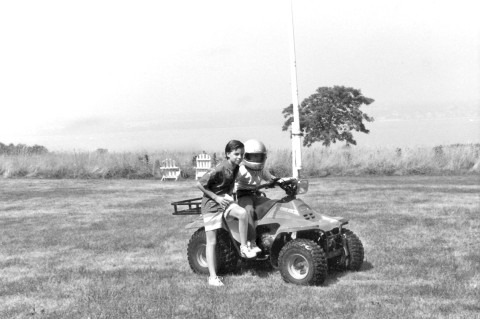
"Go faster," the seventy-two-year-old precious cargo instructed.
Who knows at what precise moment in those first few years Julia and I went from being colleagues to friends? I don't, and I doubt that she did. But I loved that she was my friend. Prone to foolishness, craving a laugh and a good time, she was a hoot. Forget her age; Julia Child never parted company with the spunky, outrageous Julia McWilliams who'd led her siblings and childhood friends through one mischievous neighborhood caper after another. She was always the slightly naughty Julia who'd piled her college friends into a 1929 Ford convertible and hauled them off to a nearby speakeasy; the adventurous Julia who, in the midst of World War II, joined the Office of Strategic Services and fearlessly ventured to far-off Ceylon (now Sri Lanka) aboard a ship with a handful of women and three thousand men; the same Julia who relished a hot dog with everything at ten in the morning.
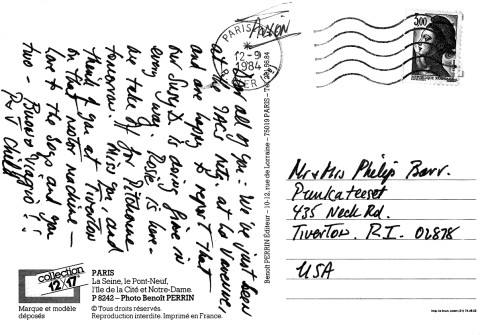
Undoubtedly, Julia was her most delightful when she was with a group of female friends, especially at culinary conferences. She reminded me of being at girls' camp or in college, when we played foolish pranks on each other, tried to sneak in after curfew, and rummaged through our roommates' closets for something to borrow. Julia and I couldn't exactly share clothes, given the difference in our sizes, but if I arrived unprepared for a turn in the weather, she'd dig up one of her cardigan sweaters for me and insist that the below-the-knee look was in. We shared scarves, and she was forever loaning me a dressy bag since I never seemed to remember to pack one. And notions, always notions, as well as cosmetics with the exception of mascara and nail polish. "I have the kind of eyes that can't wear it," she said when I asked to borrow mascara. As for the nail polish, I wore bright red and she always wore a pale fleshy pink color. "You don't notice it so much if it chips," she noted practically, and since I was always trying to cover unsightly nicks in mine, I acknowledged that she had a point.
Julia was so well prepared for everything that she always had the exact item that someone else needed and was so organized that she could always find it. However, we all drew the line at borrowing one of her rain hats. Julia's purse always held a few of those useful but dreadfully unattractive accordion-pleated plastic rain bonnets, "just in case." When "just in case" began to drizzle down, she'd put hers on, and when we all declined her offer, she'd tell us, "You'll be sorry." You have to be tremendously self-assured to wear one of those pleated shower caps in public.
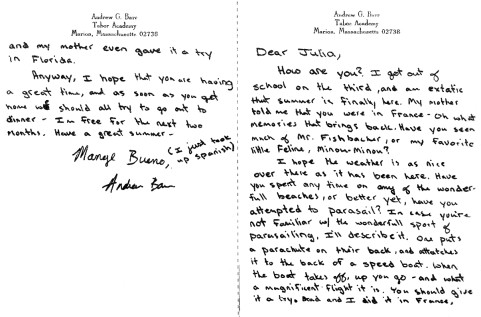
A characteristic description of a culinary conference could well be "a series of mad dashes from one event to another." Evening affairs were the most hectic, since they usually involved a change of clothes and some makeup repair. One conference night,
Gourmet
magazine's food editor, Zanne Stewart, Julia, Susy Davidson, and I were scrambling to catch the last shuttle bus to an evening event. Harried and disheveled, we scampered onto the bus and took stock of our conditions.
"Does anyone have a comb or brush?" I asked.
"I do," said Julia, reaching into her purse and coming up with a slim plastic thingamajig that looked like a large key holder.
"What's this?" I asked.
"Unfold it," she said, obviously amused. And sure enough, when I bent it back on itself, plastic bristles popped out. I had never seen one before, and I'm not sure which one of us was more delightedâme at the discovery or Julia at having surprised me so.
Meanwhile, Susy was rummaging in vain through her purse. "I need lipstick," she said.
"Wait, I have some," Julia said as she reached back into her purse and produced a utilitarian-looking black plastic tube that was obviously not from her favorite Elizabeth Arden counter. Susy twisted the tube and up twirled a stick of brilliant apple-green lipstick.
"Excuse me?"
Susy exclaimed, and Zanne and I looked at the green stick and immediately checked out Julia's lips. Had we missed green lips in our frenzied run for the bus? No. Her lips were a very pretty shade of pink and they were smiling impishly.
"Try it," she said. "It changes from green to pink when you put it on. It has something to do with your body chemistry."
None of us had seen or heard of green lipstick that turns to pink, so we all put it on, unaware of exactly how much chemistry had to do with the color. Instead of Julia's pretty pink, Susy's were a horrifying bright blue-pink; Zanne's and mine were a hideous orange that Zanne forever after referred to as "pumpkin lips." Nevertheless, we all got tubes of Magic Lips for Christmas. I also got a collapsible plastic hairbrush.
Sustaining the flexibility and spontaneity that made her so open to fun and adventure as a kid, she was, as an adult, always game for a party, a late-night dinner, or a spur-of-the-moment adventure. Mention zipping down to New York for someone's birthday, crashing a party in Santa Barbara, or even taking an excursion to Timbuktu by camel train, and her response would be, "Why not?"
In 1983, Philip and I had plans to visit Venice with our friends Dagmar de Pins and Walter Sullivan and Nan McEvoy, whom we'd met in Bologna during Marcella's classes. The Sullivans were bringing a good friend of theirs, Ron Schwartz from San Francisco. When I told Julia about our trip, she said, "That sounds like great fun."
"Why don't you come with us?" I said.
"Why not?" she said, immediately.
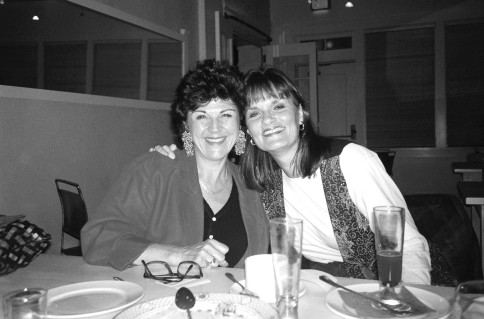
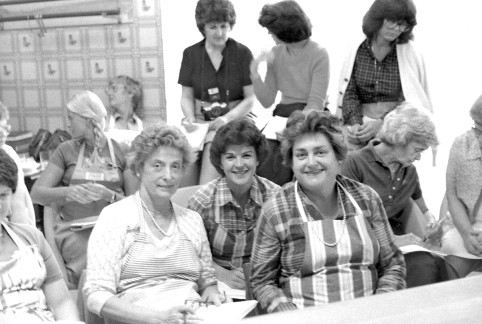
You can't always be certain that your friends are going to like your other friends, but I had a good feeling about Julia liking these friends and vice versa. Dagmar, Nan, and I had bonded from day one of cooking school. Philip and Walter, who, sadly has since passed away, were in Bologna as non-cooking participants, so as we three womenâor, as Walter called us, "the three tamales"âlearned to pound veal, hand-roll pasta, and palm little balls of bread dough into pencil-thin
grissini
, Walter and Philip hung out in Bologna and did their bonding in local restaurants.
Dagmar de Pins Sullivan is the ultimate food fanatic. In class and in restaurants, she wrote down every detail of what she ate. She purchased untold numbers of cookbooks written in English, Italian, and French. She was raised in France and still divided her time between there and California, so she was able to read the French and English books. Her Italian was limited, but she was a good guesser and an excellent cook, so she could assume her way through the Italian ones. She grew up surrounded by good food and wine; her grandfather was Georges de Latour, founder of Napa Valley's Beaulieu Vineyards. Her French-born parents, the Marquis and Marquise de Pins, insisted upon eating well.
Nan, whose grandfather Michael de Young founded the
San Francisco Chronicle
in 1865âthe original parent company of Chronicle Books, now owned by her son Nionâclaimed to be only "somewhat interested" in food and cooking. So years later, she surprised us all by starting a Tuscan-style olive grove in California and producing McEvoy Ranch oil. As Nan tells the story, she didn't intend to do it. She was merely looking for a "wonderful place in the country" where she could have her grandchildren visit and experience the great outdoors. After she fell in love with a 550-acre former dairy ranch in Petaluma, she learned that it was strictly zoned for agriculture, which meant she couldn't build so much as a tool shed without an agricultural purpose. So she went to Tuscany, bought a hundred tiny olive sprigs, and hired an Italian expert in olive oil production. The local agriculturists said it couldn't be done. In fact, Julia and I visited Nan shortly after the trees arrived and we weren't so sure it could be done. Today there are eighteen thousand trees in the grove and a very fine product on the market. Nan, much like Julia, is one of those people for whom the words "You can't do that" are fuel for determination and not water on the fire.